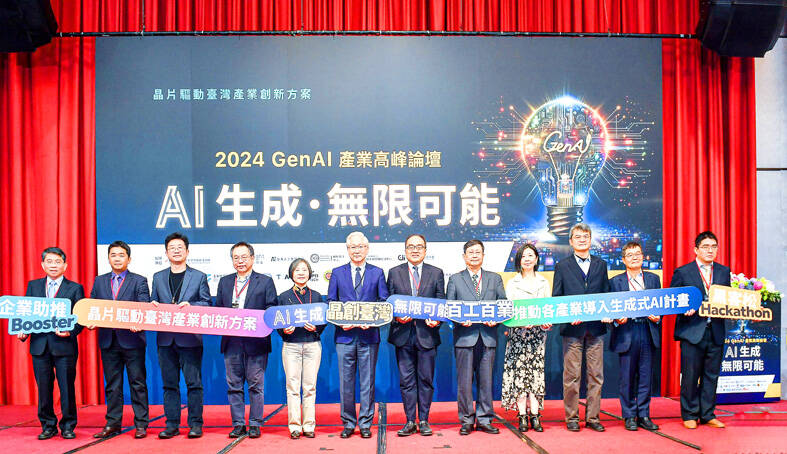Taiwan is one of the first countries to benefit from the artificial intelligence (AI) boom, but because that is largely down to a single company it also represents a risk, former Google Taiwan managing director Chien Lee-feng (簡立峰) said at an AI forum in Taipei yesterday.
Speaking at the forum on how generative AI can generate possibilities for all walks of life, Chien said Taiwan Semiconductor Manufacturing Co (TSMC, 台積電) — currently among the world’s 10 most-valuable companies due to continued optimism about AI — ensures Taiwan is one of the economies to benefit most from AI.
“This is because AI is starting a revolution in the information technology industry, which means the central processing units (CPUs) the world used to rely on for computing in computers need an update for the new AI era, and Taiwan’s chips are crucial for the production of the new graphics processing units (GPUs),” he said.

Photo courtesy of National Taiwan University
“Taiwan’s PC industry also sees ample opportunities in AI servers,” he added.
However, as TSMC’s market value is almost Taiwan’s annual GDP, “it is also a top risk factor — relying on one single industry or even one single company,” he said.
Chien told the audience that chips are not the “oil” of the 21st century, rather data is, an idea supported by the fact that several of the world’s top 10 most valuable companies are data companies such as Microsoft Corp, Apple Inc, Alphabet Inc, Meta Platforms Inc and Amazon.com Inc.
In the AI era, “the real oil is data, and semiconductors are just a conduit,” he said.
However, Chien found that Taiwan is not keeping pace in terms of familiarizing itself with data-based generative AI, symbolized by the use of AI-powered ChatGPT.
According to a survey conducted last year, “the US users of the chatbot account for about 11 percent, followed by India, Japan, Indonesia and the Philippines, while few Taiwanese utilize the interface,” he said.
He warned that “as generative AI is now best at reading and generating synopses for you, if this work has not been done for marketing or analysis in your company, you are already on the back foot.”
Chien said Taiwanese society is still not learning to interact with AI, a new technological trend that is set to impact 300 million jobs worldwide, according to a Goldman Sachs Group Inc report.
A Bloomberg ranking that placed Taiwan 14th out of 33 (higher than Japan and China) in terms of countries benefiting from AI was mainly based on Taiwan’s ability to adapt.
Chien said this means that Taiwan has a strong manufacturing-based economy that has so far absorbed the impact of AI, which has negatively affected economies that rely more on knowledge-based jobs.
Of particular note is that Taiwan’s score in “innovation” and “diffusion” are decisively lower, he added.
“It is not a tool gap but a knowledge gap if the tools are already there but people are not using them,” Chien said.

MULTIFACETED: A task force has analyzed possible scenarios and created responses to assist domestic industries in dealing with US tariffs, the economics minister said The Executive Yuan is tomorrow to announce countermeasures to US President Donald Trump’s planned reciprocal tariffs, although the details of the plan would not be made public until Monday next week, Minister of Economic Affairs J.W. Kuo (郭智輝) said yesterday. The Cabinet established an economic and trade task force in November last year to deal with US trade and tariff related issues, Kuo told reporters outside the legislature in Taipei. The task force has been analyzing and evaluating all kinds of scenarios to identify suitable responses and determine how best to assist domestic industries in managing the effects of Trump’s tariffs, he

TIGHT-LIPPED: UMC said it had no merger plans at the moment, after Nikkei Asia reported that the firm and GlobalFoundries were considering restarting merger talks United Microelectronics Corp (UMC, 聯電), the world’s No. 4 contract chipmaker, yesterday launched a new US$5 billion 12-inch chip factory in Singapore as part of its latest effort to diversify its manufacturing footprint amid growing geopolitical risks. The new factory, adjacent to UMC’s existing Singapore fab in the Pasir Res Wafer Fab Park, is scheduled to enter volume production next year, utilizing mature 22-nanometer and 28-nanometer process technologies, UMC said in a statement. The company plans to invest US$5 billion during the first phase of the new fab, which would have an installed capacity of 30,000 12-inch wafers per month, it said. The

Taiwan’s official purchasing managers’ index (PMI) last month rose 0.2 percentage points to 54.2, in a second consecutive month of expansion, thanks to front-loading demand intended to avoid potential US tariff hikes, the Chung-Hua Institution for Economic Research (CIER, 中華經濟研究院) said yesterday. While short-term demand appeared robust, uncertainties rose due to US President Donald Trump’s unpredictable trade policy, CIER president Lien Hsien-ming (連賢明) told a news conference in Taipei. Taiwan’s economy this year would be characterized by high-level fluctuations and the volatility would be wilder than most expect, Lien said Demand for electronics, particularly semiconductors, continues to benefit from US technology giants’ effort

‘SWASTICAR’: Tesla CEO Elon Musk’s close association with Donald Trump has prompted opponents to brand him a ‘Nazi’ and resulted in a dramatic drop in sales Demonstrators descended on Tesla Inc dealerships across the US, and in Europe and Canada on Saturday to protest company chief Elon Musk, who has amassed extraordinary power as a top adviser to US President Donald Trump. Waving signs with messages such as “Musk is stealing our money” and “Reclaim our country,” the protests largely took place peacefully following fiery episodes of vandalism on Tesla vehicles, dealerships and other facilities in recent weeks that US officials have denounced as terrorism. Hundreds rallied on Saturday outside the Tesla dealership in Manhattan. Some blasted Musk, the world’s richest man, while others demanded the shuttering of his